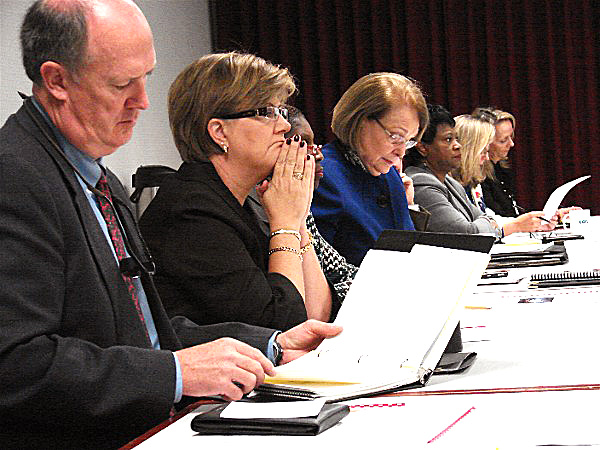
At Monday morning’s Roanoke City council briefing, City Attorney Bill Hackworth presented State Senator John Edwards with a 2011 legislative session wish list. Edwards was alone. Delegate Bill Cleaveland had met with them earlier and Delegate Onzlee Ware was expected but never arrived.
For the second year in a row the Roanoke City School Board is pleading for the General Assembly to give them the option to start the school year earlier. Chairman David Carson has made it clear that he wants the option to start no more than two weeks before Labor Day.
If school divisions miss eight days in five of ten years, they can get a Labor Day waiver. Roanoke County meets this criterion but the city does not. School board member Lori Vaught pressed a reluctant Edwards to support it. Vaught said, “having to meet higher standards of accreditation … with reduced funds is very difficult … we really need that extra time.” Edwards said after the meeting that, “it wouldn’t pass.”
With a hungry school board waiting for an encouraging word, Vice-Mayor Dave Trinkle recapped a joint meeting they had with legislators. The meeting included Delegate Cleaveland. Trinkle’s question on school funding “got smiles from across the table,” he said.
Edwards voted against the budget because it short-changed education. He said $234 million was being transferred from the general fund to a transportation fund in a “crisis situation” – that wound up siphoning funds from education.
Carson expressed fear that the federal stimulus-funding coming to the state would not go to education. He said, “at some point we hope that sanity will prevail from the state … the only sane ones seem to be our local council” – referring to the two cent meals tax increase.
Neighborhood groups like Old Southwest pushed to remove conflicting statutes that mandate emptying personal belongings from an evicted tenant’s dwelling. Hackworth said, “there ought to be a better way to do it.”
Senator Edwards was enthusiastic when it came to establishing the TransDominion Express Commission. The Commission would identify needed construction, reconstruction and improvements or repairs for passenger rail service.
Edwards thinks it is “really possible to start next year … it gets complicated … but it will happen.” The first step is money for bus service between Roanoke and Lynchburg. That would require about $100,000 from the city in operating expense.
Trinkle worried that low ridership and the early departure time might have a negative impact on the ultimate prize. The train leaves Lynchburg at 7:38 a.m. To make the bus Edwards said he’s known people who had to spend the night in a hotel. Parking is difficult and riders don’t care to leave their cars unattended.
The smart bus van carries 35 people. Edwards thinks that would be enough to justify rail service but he admitted to not knowing “the magic cutoff.” Bedford is showing interest and may share the cost to gain access.
By coordinating with the freight, Edwards believes the route could be done in stages and cost less than the projected $100 million. In addition he said he had just discovered that Norfolk Southern agreed to transfer $20 to $30 million from the Shenandoah Line to TransDominion.
Other items:
Edwards assured Hackworth that eliminating the authority of localities to levy the BPOL (Business Professional Occupation and License Tax) and machinery tax was already a dead issue.
The city would like to join localities like the Outer Banks that charge five cents for each non-biodegradable plastic bag. The collected funds could be applied toward environmental efforts.
Edwards will also carry legislation from a resolution that passed at the 2:00 p.m. council meeting. It read identical to Roanoke County’s language declaring “spice” and synthetic cannabinoid drugs illegal.
A reduction in advertising legal notices in “stated papers of record” was requested to defray newspaper print cost. Hackworth said it costs the city “over a hundred thousand a year easily” to comply with the mandate.

